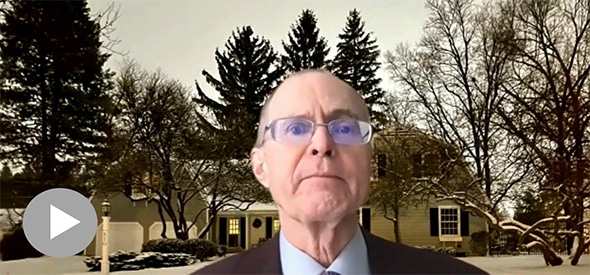18 Feb2021
By Jon Clausen
As we head toward the one year mark of the onset of the pandemic, there are many lessons learned in how we prepare candidates to use technology in education, however, there is still much to discover. At AACTE 2021 Annual Meeting, the AACTE Committee on Innovation and Technology will be presenting a Deeper Dive session, “Applying Technology-enhanced Teaching Strategies to the New Normal in 2021 and Beyond” on Thursday, February 25, 11:15 a.m. – 12:30 p.m., that looks back at the past year and how teacher education programs have responded to preparing candidates during this time. The session will also focus on how programs are moving beyond the current health crisis and how they are preparing candidates to use technology in ways that support teaching and learning to enter face-to-face, remote, and hybrid classroom environments.
In the spring of last year, when school doors closed and learning went online due to the pandemic, many school districts were left flatfooted in trying to tackle this new emergency instructional situation. Not only did they face infrastructure, access, equity, and professional development challenges, but perhaps more importantly, student engagement in the learning process was lost or disrupted in significant ways.
18 Feb2021
By Christina Sneed
“The 1619 Project” Annual Meeting Deeper Dive session on Friday, February 26, 11:15 a.m. – 12:30 p.m. features Mary Elliott, curator at the Smithsonian National Museum of African American History and Culture (NMAAHC), and Christina Sneed, high school AP English teacher in University City Schools (outside of St. Louis, MO) who taught The 1619 Project and authored the curriculum resources for The Pulitzer Center’s 1857 Project. Inspired by The 1619 Project (which reframes U.S. history by placing the consequences of slavery and the contributions of Black Americans at the very center of the historical narrative), The 1857 Project examines the Dred Scott decision and the Lincoln-Douglass Debate. In this article, Sneed shares insight into her experience teaching The 1619 Project to higher schoolers and how educators can successfully implement it across curriculum.
 I’ve been sharing my approach to teaching with the New York Times’ 1619 Project and was disturbed to read an article where Rodriguez (2021) explained that Republican lawmakers in five states (one in which I live) are introducing legislation to “punish schools that provide lessons derived from this project.” Unfortunately, we’ve seen this strategy used throughout history as a method to manipulate national memory. It forces reflection on the quandary, “Who gets to write history?” The answer is rooted in white supremacy. Recollect America’s Reconstruction period when the United Daughters of the Confederacy distorted the narrative surrounding who won the Civil War by using propaganda, monuments, and education-based indoctrination. They created state-sanctioned counter narratives that still plague America. Recently, Republicans used this tactic to establish the 1776 Commission in opposition to the 1619 Project. Such acts stem from fear that, if average Americans learn accurate accounts of history—without white washing, omission, erasure—white men will lose power. They fear teachers will inform students of America’s ugliest parts and sell a version of history that negatively depicts certain groups of people in order to create ”heroes” and “patriots” in others (what they’ve been guilty of for centuries).
I’ve been sharing my approach to teaching with the New York Times’ 1619 Project and was disturbed to read an article where Rodriguez (2021) explained that Republican lawmakers in five states (one in which I live) are introducing legislation to “punish schools that provide lessons derived from this project.” Unfortunately, we’ve seen this strategy used throughout history as a method to manipulate national memory. It forces reflection on the quandary, “Who gets to write history?” The answer is rooted in white supremacy. Recollect America’s Reconstruction period when the United Daughters of the Confederacy distorted the narrative surrounding who won the Civil War by using propaganda, monuments, and education-based indoctrination. They created state-sanctioned counter narratives that still plague America. Recently, Republicans used this tactic to establish the 1776 Commission in opposition to the 1619 Project. Such acts stem from fear that, if average Americans learn accurate accounts of history—without white washing, omission, erasure—white men will lose power. They fear teachers will inform students of America’s ugliest parts and sell a version of history that negatively depicts certain groups of people in order to create ”heroes” and “patriots” in others (what they’ve been guilty of for centuries).
18 Feb2021
By Alfredo J. Artiles
Alfredo Artiles of Stanford Graduate School of Education, Khiara Bridges, UC Berkley School of Law and Sonya Ramsey of University of North Carolina at Charlotte will join moderator John Blackwell of Virginia State University in presenting the 2021 Annual Meeting Deeper Dive session, “Critical-Race Theory and Countering Political Culture,” Thursday, February 25, 11:15 a.m. – 12:30 p.m. In this article, Artiles discusses the power of disability through its longstanding historical links with race, and outlines the transformations needed in teacher education so that future teachers are prepared to understand and engage thoughtfully with the complexities of disability and its intersections.
Disability touches the lives of all human beings in one way or another during their lifetime. It is not surprising, therefore, that most societies deploy protections and supports for people with disabilities. But just as disability constitutes an object of protection, it is necessary to remember that disability can also be used as a tool of stratification. This is most clearly observed in contexts in which disability intersects with other markers of difference, such as race. The dual nature of disability is a neglected consideration in the analysis and responses to this condition, particularly in the context of teacher education. Indeed, most preservice teachers are rarely exposed to the complexities of this duality and its implications.
16 Feb2021
By Jane E. West
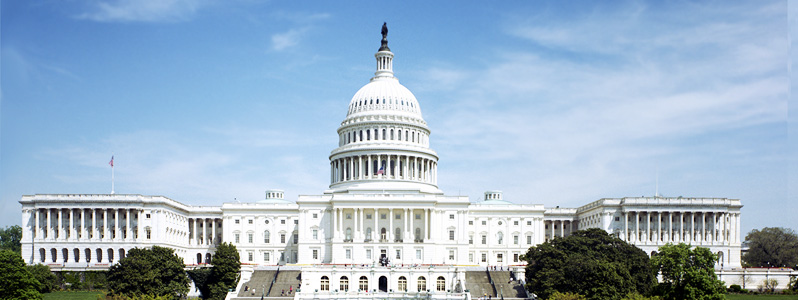
Biden’s COVID Relief Proposal Moves Forward in the House
As per the requirements of the Budget Resolution that passed earlier this month, the shift was made this week to committees of jurisdiction. Eleven committees are involved in the House and each must draft an individual bill in compliance with the instructions in the Budget Resolution. Then the Committees submit those bills back to the Budget Committee, which creates the overall $1.9 trillion package to be considered by the full House. The same process is supposed to occur in the Senate—all with the deadline of March 14 when current COVID unemployment supplements expire.
Three Committees include important provisions related to education. The first—the Committee on Education and Labor—finalized their $170 billion proposal for education, over twice the annual budget for the Department of Education. The Committee approved the measure, 27-21, along party lines after considering more than 30 amendments, several of which were intended to require schools to reopen for in-person instruction. The $170 billion is comprised of $130 billion for K-12 schools and $40 billion for higher education. Led by Chair Bobby Scott (D-Va.), the Committee package also includes an increase of the minimum wage to $15 per hour, which Republicans oppose.
16 Feb2021
By Caroline Forrest and Cori Woytek
This is the second article in a two-part series. Read the first part, titled “Video Observation Improves Teacher Preparation and Enhances Collaboration.” Authors Caroline Forrest and Cori Woytek will be presenting a live Q&A session at the 2021 Annual Meeting, “Using Video Across Diverse Settings to Provide Meaningful Feedback & Facilitate Reflective Conversations,” Thursday, February 25, 1:30 – 2:30 pm.
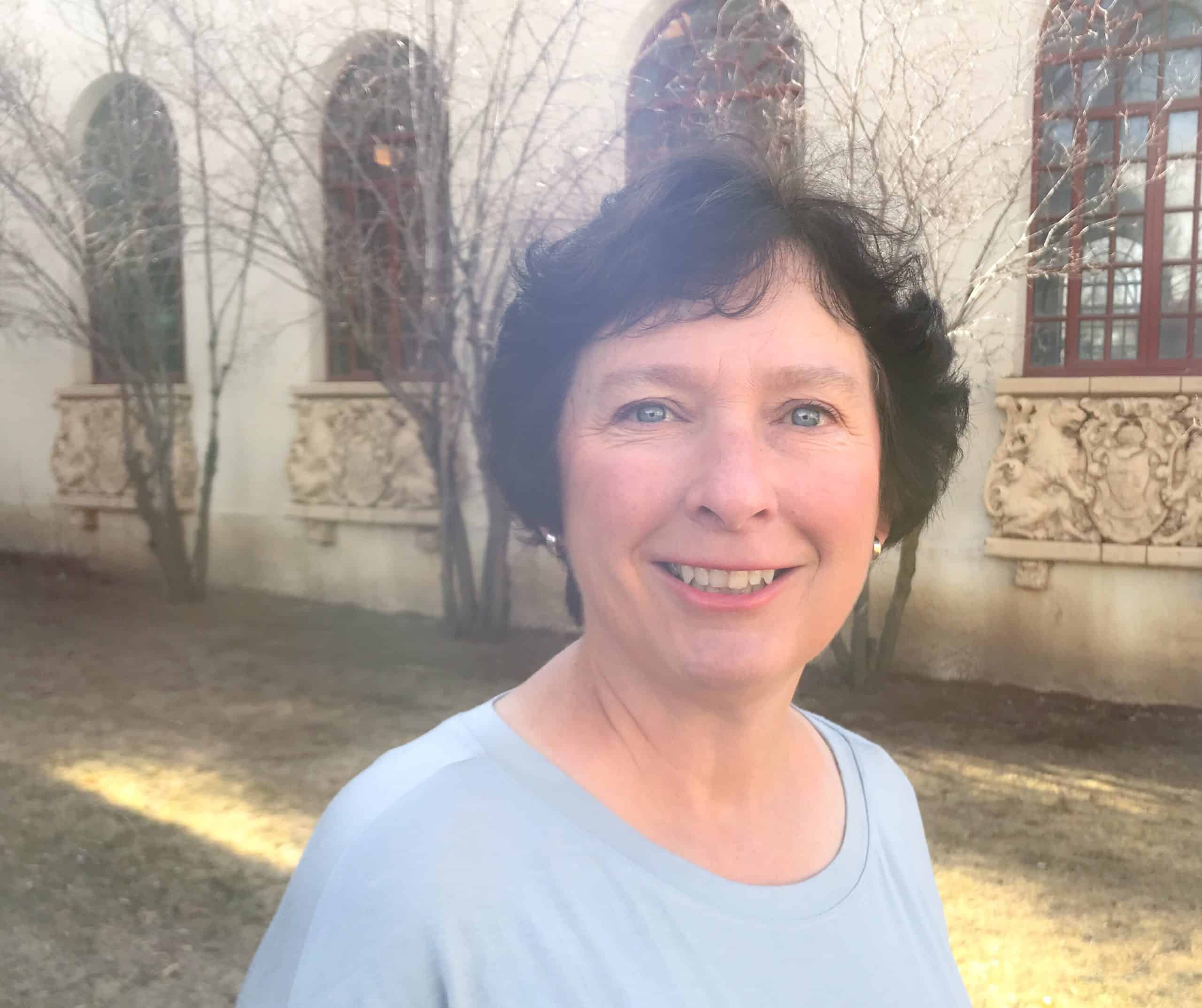
Caroline Forrest
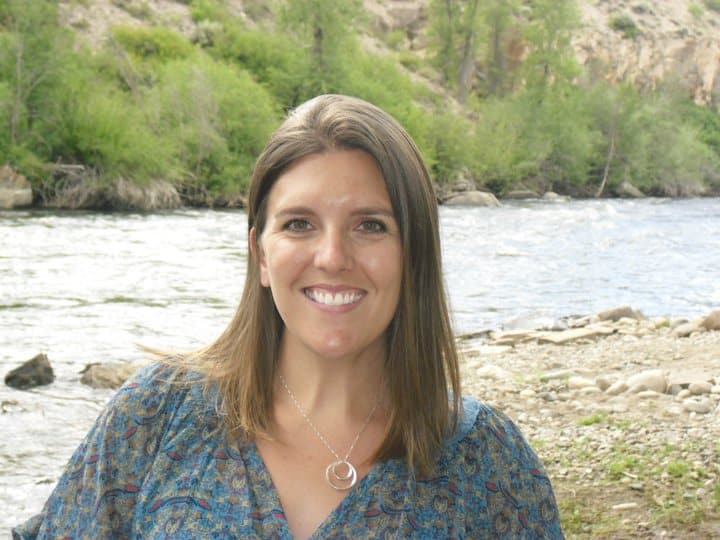
Cori Woytek
Many teacher preparation programs have faced unprecedented challenges this past year because of COVID-19. Schools have moved to online instruction and in-person support of student teachers has become difficult, if not impossible.
In response to the crisis, many institutions have incorporated videoed observations and feedback as part of their programs—a move that our teacher education program here at Western Colorado University took four years ago prior to the pandemic.
Fortunately, having a video feedback structure in place has enabled us to continue to support our residents – and continue to provide them with effective, rich, and applicable feedback – during this time.
13 Feb2021
By Jerrica Thurman
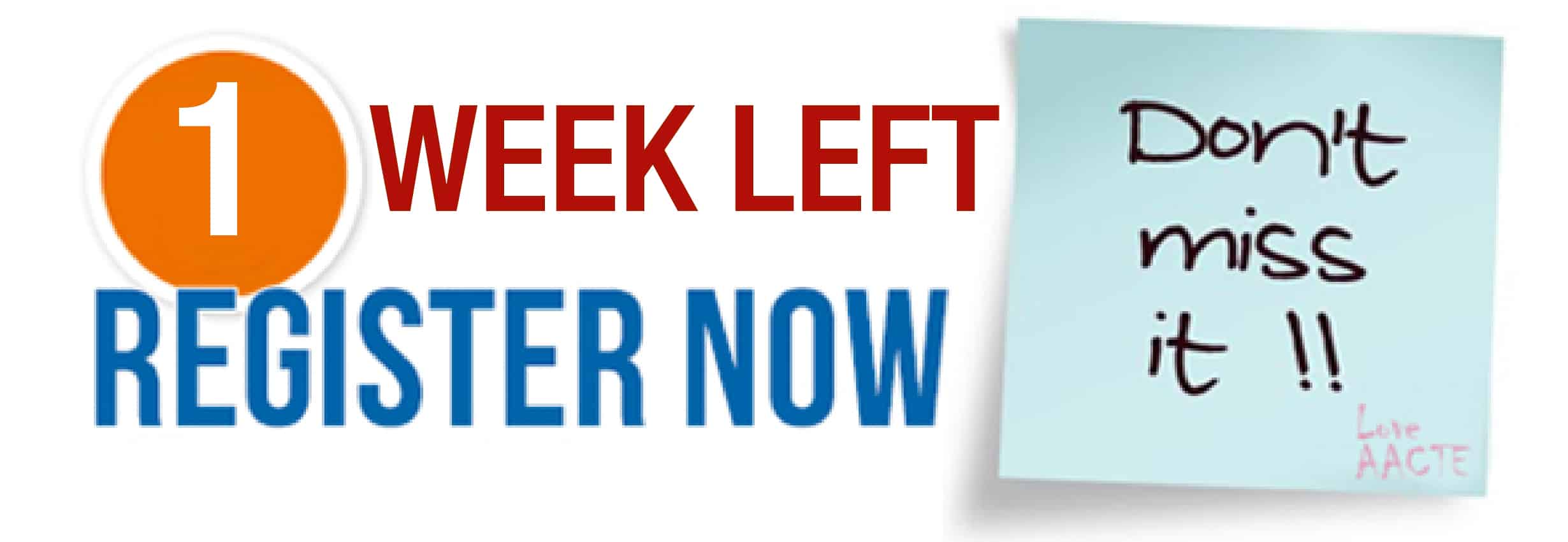
Friday, February 19, is the last the day to register for the virtual AACTE 2021 Annual Meeting, February 24-26. Prepare to revolutionize education with innovative tools and resources on display in the Conference Community Center. Connect with our sponsors and exhibitors through hands-on demonstrations of new products, discuss solutions to your needs, and gain new insights to grow your programs!
Be sure to visit the AACTE Membership Booth! Learn about member resources and tools, connect with other attendees and AACTE staff, and test your trivia knowledge for a chance to win prizes! The Conference Community Center will feature a number of activities. Read more in this recent blog.

Looking to unwind? AACTE has you covered with yoga breaks to stretch your body and mind. Come laugh with AACTE during the Laughing Yoga Break, learn more about Lazy Yoga and other yoga tips, and attend the Dueling DJs reception. Take advantage of these activities and more to stay alert and engaged. Read more in this recent blog.
There’s only one week left to register! Registration will close February 19. Register now and invite your colleagues and students to participate in AACTE’s 2021 Annual Meeting. View the event schedule and details at www.aacte.org. Follow us on Twitter and Facebook, and join the conversation using #AACTE21.
Come experience the reimagined AACTE Annual Meeting – One community. One purpose. One voice.
13 Feb2021
By JTE Insider

Listen to the recent JTE Insider podcast by the Journal of Teacher Education (JTE) editorial team. This blog is available to the public, and AACTE members have free access to the articles in the JTE online archives—just log in with your AACTE profile.
This podcast interview features insights from the article “Historians, Archivists, and Museum Educators as Teacher Educators: Mentoring Preservice History Teachers at Cultural Institutes,” by Tim Patterson. The article was published in the January/February issue of the Journal of Teacher Education.
13 Feb2021
By Katrina Norfleet
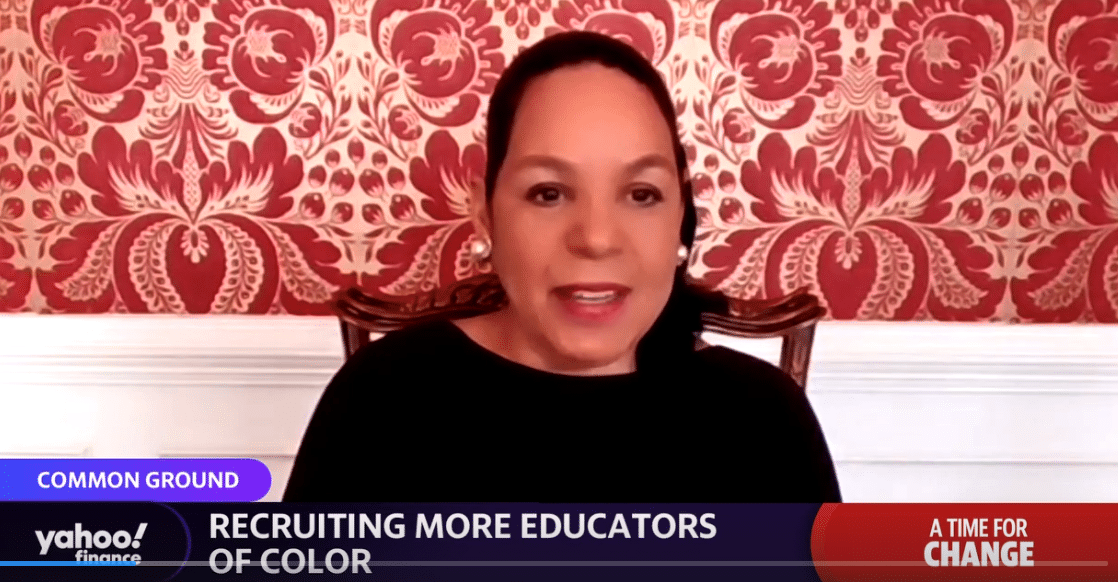 Findings show that in the public school system nationwide, only 7% of teachers, 11% of principals, and 3% of superintendents are Black. In the following Yahoo Finance Live video interview, AACTE Dean in Residence Leslie Fenwick explores this topic. She discusses the impact desegregation of public schools has had on the decline of the Black teacher pipeline and what steps should be taken to reverse the trend.
Findings show that in the public school system nationwide, only 7% of teachers, 11% of principals, and 3% of superintendents are Black. In the following Yahoo Finance Live video interview, AACTE Dean in Residence Leslie Fenwick explores this topic. She discusses the impact desegregation of public schools has had on the decline of the Black teacher pipeline and what steps should be taken to reverse the trend.
Watch the video.
12 Feb2021
By Wendy Burke
Wendy Burke of Eastern Michigan University, Paul Gorski of Equity Literacy Institute, and Lori Piowlski of National University are presenters at the virtual 2021 Annual Meeting session, Advancing Equity through Social Emotional Learning on Friday, February 26, 11:15 a.m. – 12:30 p.m. In this article, Burke shares her experience in preparing educators to attend to the social emotional learning needs of P-12 students.
My point of entry into thinking about the relationship between equity and SEL began about 12 years ago when I became involved in a grant program for Gaining Early Awareness and Readiness for Undergraduate Programs (G.E.A.R-U.P). This program provided me the critical professional learning I needed while working for six years with a cohort of 60 middle schools as they matriculated from middle school into high school and then post-secondary institutions. I witnessed the many inequitable and often discriminatory practices within classrooms these students experienced while trying to lift themselves out of poverty.
12 Feb2021
By Linda Minor

As the AACTE 73rd Annual Meeting gets closer, some of our past attendees from our first virtual event, Washington Week, talk about what they are most looking forward to and what attendees can expect from the online experience.
“As a reluctant virtual conference attendee, I can say that my experience during Washington Week in September changed my perspective! The way in which AACTE handled Washington Week was absolutely phenomenal. The interaction, attention to detail, and ability to connect with colleagues and presenters made the experience first rate and I have definitely changed my mind about virtual conferences and I am looking forward to AACTE Annual Meeting in February!”
Jon E. Pedersen, University of South Carolina
12 Feb2021
By Linda Minor

Join your friends and colleagues at the end of the first day of the Annual Meeting for our Dueling DJs reception, Wednesday, February 24 from 5:15 – 6:00pm. The host DJs will play songs through the decades that you know and will want to sing along to. Then you can vote on which DJ is spinning the best, or your favorite, songs.
12 Feb2021
By K. Stanley Brooks
K. Stanley Brooks of Chosen Path Consulting, Marvin Lynn of Portland State University, and Christina “V” Villarreal of the Harvard Graduate School of Education will present the session, “Identifying, Understanding, and Replacing Racist Curricula” at the virtual 2021 Annual Meeting, Wednesday, February 24, 10:00 – 11:00 a.m. In this article, Brooks offers a preview of the session by asking key questions for inquiry and reflection on what it means to engage in an anti-racist manner in the academic space.
Our curriculum is not already anti-racist? If our curriculum is not already anti-racist, then what have we been allowing and promoting all these years?
Greetings to you from Minneapolis, Minnesota. This city was the center of world news on May 25, 2020, and the days following the reaction to the killing of George Floyd. It is not just one person, but a disturbing pattern that can be linked to the interactions between the first enslaved Africans and White Americans to the banks of Jamestown, Virginia in 1619. Perhaps you have heard the names of Breonna Taylor, Ahmad Aubrey, Tamir Rice, Trayvon Martin, Eric Garner, and many more. Many assume that college campuses are places of higher thought and scholarship, where students and faculty/staff of color are immune to the horrors of racial microaggressions and assaults. One of the primary ways these spaces are hostile toward people of color is through the academic plans (practicum, course content, course selection, guest speakers, hiring practices, athletics, etc.) for our students.
11 Feb2021
By Robert Floden
As chair-elect of the AACTE Board of Directors, I invite you to join me and your colleagues at the AACTE virtual
2021 Annual Meeting, February 24-26. Education leaders from across the nation will convene and share innovative perspectives, orientations, strategies, and technologies designed to address equity and inclusivity among diverse groups of learners and school contexts.
Inclusion and equity are overarching principles that should guide all educational policies, preparation programs, and practices. To do so effectively, educators must recognize the principle that education, particularly in an inclusive democracy, is both a fundamental right and the foundation for more equitable, inclusive, and cohesive communities.
Themed “Resisting Hate, Restoring Hope: Engaging in Courageous Action,” this year’s conference will feature four strands: Equity and Inclusivity in Preparation and Practice; Activism for Renewing Democracy; Establishing a Sustainable and Diverse Profession; and Clinical Practice and Community Engagement. The Equity and Inclusivity in Preparation and Practice strand will leverage the collective knowledge and experience of leading experts on ways to advance AACTE’s strategic direction to revolutionize education for all learners and focus on diversity, equity, and inclusion.
Watch the video to learn more about the virtual conference. The February 19 registration deadline is quickly approaching!
Register now and invite your colleagues and students to participate in AACTE’s 2021 Annual Meeting. View the event schedule and details at
www.aacte.org. Follow us on
Twitter and
Facebook, and join the conversation using #AACTE21.
Should you have any questions, please feel free to contact AACTE’s Events Team at
events@aacte.org.
I look forward to greeting you at AACTE’s virtual conference in two weeks!
Sincerely,
Robert Floden, Ph.D.
Chair-Elect, AACTE Board of Directors
Dean, College of Education, Michigan State University

11 Feb2021
By Meghan Grenda
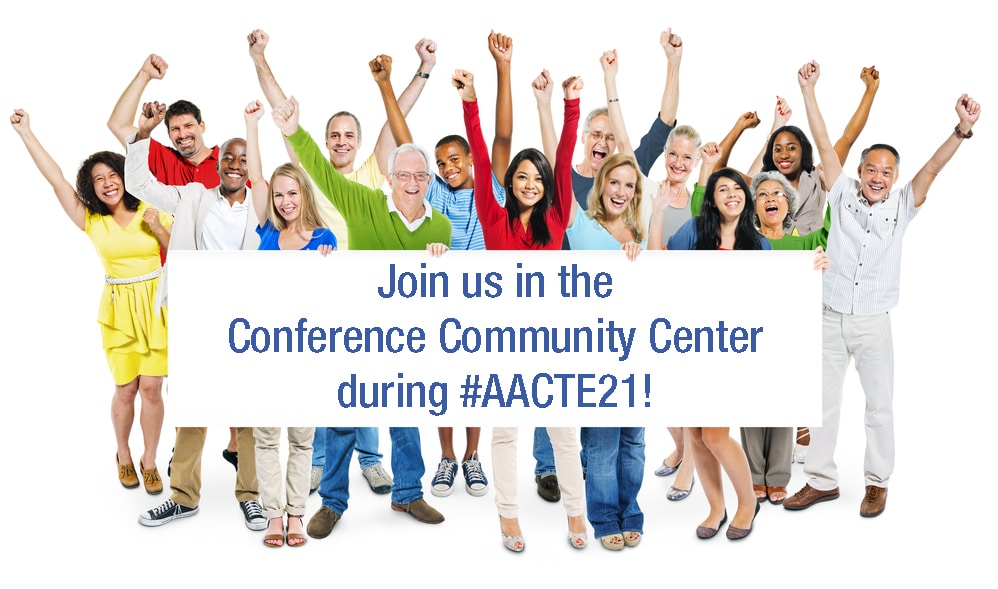
AACTE invites all members of the 73rd Annual Meeting to visit the virtual Conference Community Center. Learn about member resources, connect with other attendees and AACTE staff, and test your AACTE trivia knowledge for a chance to win one of many prizes! The Conference Community Center will feature a number of activities:
AACTE Connect360
This new members-only resource is an engaging and interactive virtual platform that brings together AACTE’s community of 15,000+ individuals in an exciting way. You will be able to start discussions and ask questions of fellow AACTE members, comment on each other’s posts, share best practices, and create your own unique member profile. Visit the Conference Community Center for a demonstration of how the community works.
11 Feb2021
By Terrance McNeil
The members of AACTE’s HBCU Teacher Education Topical Action Group (TAG) are very proud of the contributions of Historically Black Colleges and Universities’ (HBCU) educators and researchers and the work that they have done within and beyond academia. More importantly, we commend the contributions made through the discourse and praxis on equity in education. We want to celebrate these contributions and promote the excellence that emanates from HBCU educator preparation programs. We look forward to your participation at our annual business virtual meeting on February 23, 2021 from 4:00 to 6:00 pm.
In keeping with this year’s theme, Resisting Hate, Restoring Hope: Engaging in Courageous Action, The HBCU Teacher Education TAG will engage in a discussion on how we are instrumental in this purpose by using our unique positionally to provide leadership on issues of diversity and inclusion. We hope you will consider joining us.


 I’ve been sharing my approach to teaching with the New York Times’ 1619 Project and was disturbed to read an article where Rodriguez (2021) explained that Republican lawmakers in five states (one in which I live) are introducing legislation to “punish schools that provide lessons derived from this project.” Unfortunately, we’ve seen this strategy used throughout history as a method to manipulate national memory. It forces reflection on the quandary, “Who gets to write history?” The answer is rooted in white supremacy. Recollect America’s Reconstruction period when the United Daughters of the Confederacy distorted the narrative surrounding who won the Civil War by using propaganda, monuments, and education-based indoctrination. They created state-sanctioned counter narratives that still plague America. Recently, Republicans used this tactic to establish the 1776 Commission in opposition to the 1619 Project. Such acts stem from fear that, if average Americans learn accurate accounts of history—without white washing, omission, erasure—white men will lose power. They fear teachers will inform students of America’s ugliest parts and sell a version of history that negatively depicts certain groups of people in order to create ”heroes” and “patriots” in others (what they’ve been guilty of for centuries).
I’ve been sharing my approach to teaching with the New York Times’ 1619 Project and was disturbed to read an article where Rodriguez (2021) explained that Republican lawmakers in five states (one in which I live) are introducing legislation to “punish schools that provide lessons derived from this project.” Unfortunately, we’ve seen this strategy used throughout history as a method to manipulate national memory. It forces reflection on the quandary, “Who gets to write history?” The answer is rooted in white supremacy. Recollect America’s Reconstruction period when the United Daughters of the Confederacy distorted the narrative surrounding who won the Civil War by using propaganda, monuments, and education-based indoctrination. They created state-sanctioned counter narratives that still plague America. Recently, Republicans used this tactic to establish the 1776 Commission in opposition to the 1619 Project. Such acts stem from fear that, if average Americans learn accurate accounts of history—without white washing, omission, erasure—white men will lose power. They fear teachers will inform students of America’s ugliest parts and sell a version of history that negatively depicts certain groups of people in order to create ”heroes” and “patriots” in others (what they’ve been guilty of for centuries).






 Findings show that in the public school system nationwide, only 7% of teachers, 11% of principals, and 3% of superintendents are Black. In the following Yahoo Finance Live video interview, AACTE Dean in Residence Leslie Fenwick explores this topic. She discusses the impact desegregation of public schools has had on the decline of the Black teacher pipeline and what steps should be taken to reverse the trend.
Findings show that in the public school system nationwide, only 7% of teachers, 11% of principals, and 3% of superintendents are Black. In the following Yahoo Finance Live video interview, AACTE Dean in Residence Leslie Fenwick explores this topic. She discusses the impact desegregation of public schools has had on the decline of the Black teacher pipeline and what steps should be taken to reverse the trend. 

